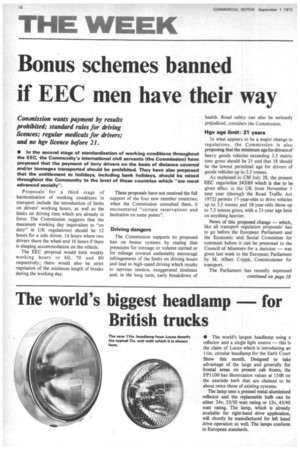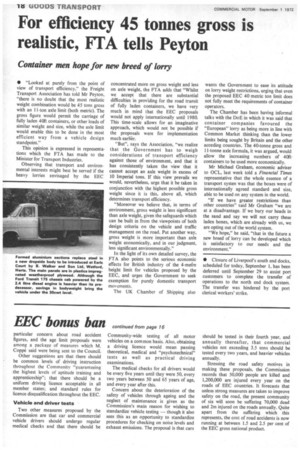Bonus schemes banned if EEC men have their way
Page 18

Page 20

If you've noticed an error in this article please click here to report it so we can fix it.
Commission wants payment by results prohibited; standard rules for driving licences; regular nsedicals for drivers; and no hgv licence before 21.
• In the second stage of standardization of working conditions throughout the EEC, the Community's international civil servants (the Commission) have proposed that the payment of lorry drivers on the basis of distance covered and/or tonnages transported should be prohibited. They have also proposed that the entitlement to holidays, including bank holidays, should be raised throughout the Community to the level of those countries which "are most advanced socially".
Proposals for a third stage of harmonization of working conditions in transport include the introduction of limits on drivers' working hours, as well as the limits on driving time which are already in force. The Commission suggests that the maximum working day (equivalent to "on duty" in UK regulations) should be 12 hours for a solo driver, 14 hours where two drivers share the wheel and 16 hours if there is sleeping accommodation on the vehicle.
The EEC proposal would limit weekly working hours to 60, 70 and 80 respectively; there would also be strict regulation of the minimum length of breaks during the working day. These proposals have not received the full support of the four new member countries; when the Commission consulted them, it encountered "certain reservations and hesitation on some points".
Driving dangers The Commission supports its proposed ban on bonus systems by stating that premiums for tonnage or volume carried or for mileage covered undeniably encourage infringements of the limits on driving hours and lead to high-speed driving which results in nervous tension, exaggerated tiredness and, in the long term, early breakdown of health. Road safety can also be seriously prejudiced, considers the Commission.
Hgv age limit: 21 years In what appears to be a major change in regulations, the Commission is also proposing that the minimum age for drivers of heavy goods vehicles exceeding 3.5 metric tons gross should be 21 and that 18 should be the lowest permitted age for drivers of goods vehicles up to 3.5 tonnes.
As explained in CM July 28, the present EEC regulation 543/69 which is due to be given effect. in the UK from November 1 next year (through the Road Traffic Act 1972) permits 17-year-olds to drive vehicles up to 3.5 tonnes and 18-year-olds those up to 7.5 tonnes gross, with a 21-year age limit on anything heavier.
News of this proposed change — which, like all transport regulation proposals' has to go before the European Parliament and the Economic and Social Committee for comment before it can be presented to the Council of Ministers for a decision — was given last week to the European Parliament by M. Albert Coppe, Commissioner for transport.
The Parliament has recently expressed continued on page 18 particular concern about road accident figures, and the age limit proposals were among a package of measures which M. Coppe said were being sent to the Council.
Other suggestions are that there should be common levels of driving instruction throughout the Community "guaranteeing the highest levels of aptitude training and apprenticeship"; that there should be a uniform driving licence acceptable in all member states; and standard rules for licence disqualification throughout the EEC.
Vehicle and driver tests
Two other measures proposed by the Commission are that car and commercial vehicle drivers should undergo regular medical checks and that there should be Community-wide testing of all motor vehicles on a common basis. Also, obtaining a driving licence would mean passing theoretical, medical and "psychotechnical" tests as well as practical driving examinations.
The medical checks for all drivers would be every five years until they were 50, every two years between 50 and 65 years of age, and every year after this.
Concern about the deterioration of the safety of vehicles through ageing and the neglect of maintenance is given as the Commission's main reason for wishing to standardize vehicle testing — though it also sees this as an opportunity to standardize procedures for checking on noise levels and exhaust emissions. The proposal is that cars should be tested in their fourth year, and annually thereafter, that commercial vehicles not exceeding 3.5 tons should be tested every two years, and heavier vehicles annually.
Stressing the road safety motives in making these proposals. the Commission records that 50,000 people are killed and 1,200,000 are injured every year on the roads of EEC countries. It forecasts that unless strong measures are taken to improve safety on the road, the present community of six will soon be suffering 70,000 dead and 2m injured on the roads annually. Quite apart from the suffering which this represents, the cost of road accidents is now running at between 1.5 and 2.5 per cent of the EEC gross national product.


































































































